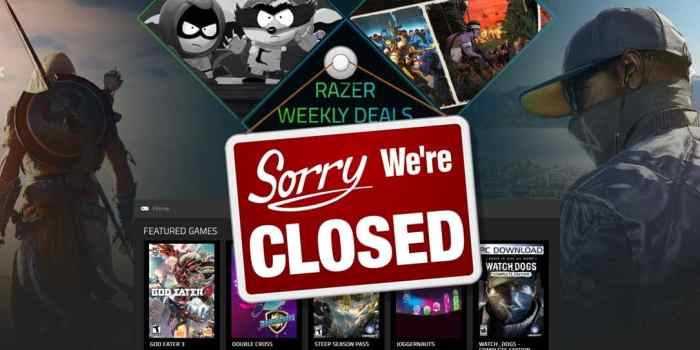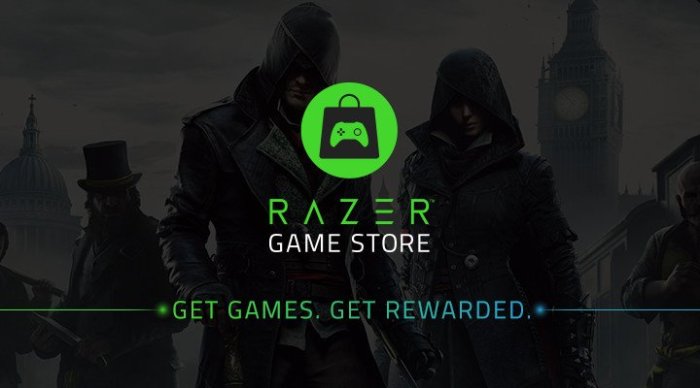Razer game store to shut down on february 28th – Razer Game Store to Shut Down February 28th – Yep, you read that right. The gaming world is buzzing after Razer’s official announcement that its digital storefront is closing its virtual doors at the end of February. This isn’t just another game store biting the dust; it’s a significant event for Razer, its customers, and the broader gaming landscape. What went wrong? What happens to your games? And what does this mean for the future of Razer’s gaming ecosystem? Buckle up, gamers, because we’re diving deep into the details.
The closure announcement, which dropped [Insert Date of Announcement Here] via [Insert Official Source, e.g., Razer’s website, press release], sent shockwaves through the gaming community. Razer cited [Insert Briefly Summarized Reasons Given for Closure from Artikel Point 1] as the primary reasons behind the decision. The announcement also detailed the process for refunds and game transfers, which we’ll break down in detail. But let’s be real, the bigger question is: what does this mean for the future of digital game distribution, and what alternatives do gamers now have?
Impact on Razer Customers
The impending closure of the Razer Game Store on February 28th leaves a significant number of gamers in a bit of a pickle. For those who’ve invested in games or have outstanding balances, the immediate impact is a sudden shift in where they can access their digital purchases and manage their accounts. This isn’t just about inconvenience; it’s about the potential loss of access to games, and the uncertainty surrounding refunds and license transfers.
The closure necessitates a clear and efficient process for customers to recoup their investments or secure their game licenses. The speed and transparency of this process will significantly determine the long-term impact on Razer’s reputation and customer loyalty. A poorly managed transition could erode trust and leave a lasting negative impression, potentially driving customers towards competing platforms.
Refund and License Transfer Procedures, Razer game store to shut down on february 28th
Razer needs to provide a straightforward and accessible method for customers to receive refunds for any unused games or outstanding balances. This should involve a clear timeline, a user-friendly online portal, or potentially direct communication via email or phone. The process for transferring game licenses, where possible, must also be clearly Artikeld and easily executed. Failing to do so efficiently could lead to widespread frustration and negative reviews. A good example of a successful transition would be a system similar to how GOG handles store closures, offering clear instructions and ample time for users to transfer their licenses. Conversely, a poorly handled situation might resemble the fallout from a poorly managed digital store closure in the past, where customers struggled to obtain refunds or retrieve their purchases, leading to considerable backlash.
Long-Term Implications for Razer’s Customer Loyalty and Brand Image
The Razer Game Store closure’s success will be measured not only by the efficiency of the refund process but also by how it impacts customer perception of the Razer brand. A seamless transition, with readily available support and transparent communication, can mitigate potential damage. However, a drawn-out, confusing, or unhelpful process could seriously damage Razer’s reputation and lead to a loss of customer trust. This is especially crucial given the fiercely competitive nature of the gaming market. Negative experiences can quickly spread online, impacting future sales and the company’s overall image. For example, a similar situation with a less-known brand might result in a minor impact, while a company like Razer, with a substantial customer base, risks significant damage to its brand equity if the situation isn’t handled with care and expertise.
Future of Razer’s Gaming Ecosystem: Razer Game Store To Shut Down On February 28th
The Razer Game Store’s closure marks a significant shift in Razer’s gaming strategy. While it focused on a smaller slice of the digital distribution pie, its demise necessitates a re-evaluation of Razer’s overall ecosystem and its relationship with the broader gaming industry. The move impacts not only Razer’s direct sales but also its standing with developers and publishers who relied on the platform for distribution.
The closure highlights the challenges of competing in a saturated market dominated by giants like Steam, Epic Games Store, and GOG. Razer’s strengths lie elsewhere—in its hardware and peripherals—and the company now needs to leverage these strengths to redefine its role within the gaming ecosystem. This means a strategic recalibration of its digital ambitions.
Razer’s Altered Relationships with Developers and Publishers
The shutdown directly impacts Razer’s relationships with game developers and publishers. Those who partnered with the Razer Game Store now need to explore alternative distribution channels, potentially incurring costs and effort in the process. This could lead to some strained relationships, particularly with smaller studios who heavily relied on Razer’s platform for exposure. Razer will need to actively address these concerns and possibly offer support to mitigate any negative fallout. Building and maintaining strong relationships with developers and publishers will be crucial for any future digital ventures. For example, Razer could focus on offering bespoke marketing and promotional services to developers in lieu of a direct distribution platform.
Potential Future Strategies for Digital Distribution
Razer’s future in digital distribution might involve focusing on niche markets or strategic partnerships. Instead of competing head-on with established giants, Razer could concentrate on offering curated collections of games tailored to specific genres or communities that align with its brand identity. Alternatively, Razer could leverage its hardware ecosystem by integrating digital services directly into its products. Imagine a scenario where purchasing a Razer gaming laptop grants access to a curated library of games or exclusive in-game content. This approach would directly tie the digital offering to the hardware, creating a unique value proposition. This is similar to how PlayStation and Xbox bundle games with their consoles, creating a synergistic relationship between hardware and software.
Alternative Strategy: A Razer-Branded Game Subscription Service
A compelling alternative strategy for Razer would be to launch a subscription-based gaming service. This could focus on providing access to a rotating library of indie and AAA titles, potentially leveraging existing partnerships or creating new ones. The service could be integrated with Razer’s hardware, offering optimized performance and exclusive features for subscribers. This strategy would allow Razer to compete not on sheer game volume but on curated selection and a premium experience, catering to a more discerning audience. Examples include Xbox Game Pass and PlayStation Plus, which have proven successful by offering a value-added experience for gamers. Razer could differentiate itself by offering unique perks, such as exclusive hardware discounts or early access to new titles.
The Razer Game Store’s impending closure is more than just a business decision; it’s a case study in the ever-evolving digital gaming market. While the reasons behind the shutdown remain somewhat shrouded in strategic ambiguity, one thing’s clear: gamers are now looking towards Steam, Epic, and other platforms to fill the void. The impact on Razer’s brand image and customer loyalty remains to be seen, but the company’s future moves in the digital game distribution space will be closely watched. This closure serves as a reminder that even major players can’t always guarantee a permanent spot in the fast-paced world of digital gaming.
 Informatif Berita Informatif Terbaru
Informatif Berita Informatif Terbaru

